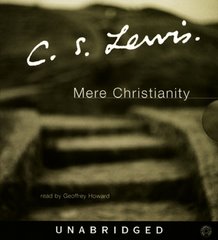In this chapter Lewis is answering the two crucial questions answered first in the Gospels: "Who is Jesus Christ?" and "What did he do?" On the first reading it looks like Lewis is downplaying theology. Quite the opposite is true. While he is hesitant to dig deep (remember his target audience), his bare-bones presentation calls the reader to embrace the death of Christ on his own behalf. That is theology. A chapter summary would have to be what Lewis calls "the catch." He says: "Only a bad person needs to repent: only a good person can repent perfectly. The worse you are the more you need it and the less you can do it. The only person who could do it perfectly would be a perfect person—and he would not need it.” Two questions for you: First, how does this knowledge that we are calling sinners to do what they have no power to do affect our theology? And, second, how does this affect our attitude when we seek to evangelize lost people?
Tuesday, October 23, 2007
Thursday, October 18, 2007
Mere Christianity, Book 2, Chapter 3: "The Shocking Alternative"
I forgot to blog this last week for all of you non-Facebook people. Sorry. Here it goes:
Lewis gets to the heart of idolatry: men trying to "invent some sort of happiness for themselves outside God, apart from God." It is easy to throw stones at the list of consequences Lewis gives that result from trying to find substitutes to happiness in God: "money, poverty, ambition, war, prostitution, classes, empires, slavery." I think I should be more concerned about the consequences of my own God substitutes. When I think happiness is bound up in people liking me, I am controlled (and often crushed) by the opinions of others. When I seek joy in things I am convinced I am "way good at," I get depressed when people fall asleep during the sermon or when my Hebrew instructor humbles me with my own ignorance. The answer, then, is found in the "shocking alternative." If I merely admire his teachings I can add Jesus to my shelf full of idols. If he is Lord and God, my joy in him is complete no matter how I perform in the pulpit, the classroom or in front of my peers.
I will try to post Facebook or e-mail comments.
Tuesday, October 02, 2007
Book 2, Chapter 1: The Rival Conceptions of God
Something I like about this chapter is that, in classic Mere Christianity form, Lewis makes "good" the standard and "bad" the perversion. In other words, even the unspeakable evil around us points us to redemption. God is in the process of making everything right. Be humbled if you are part of the army God is using to rescue captives from the kingdom of darkness. Be humbled if you are having a hard week because your Redeemer is faithful and true. He is going to straighten it out—perhaps using your uncomfortable week as his hammer. "If the whole universe has no meaning, we should never have found out that it has no meaning." What do you think?
Subscribe to:
Comments (Atom)

